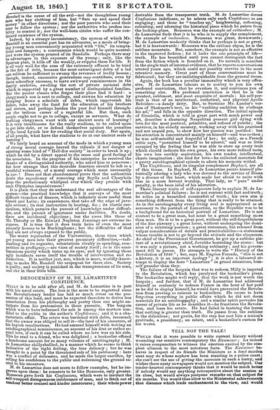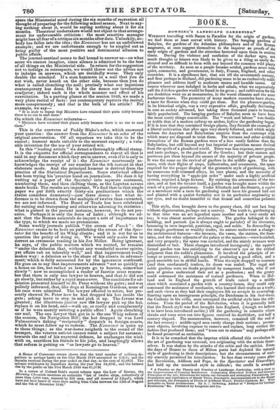TELL NOT THE TALE!
WOULD that it were possible to write current history without wounding our sensitive contemporary the Examiner; for indeed it raises compunction to witness the emotion excited by the aim: pleat allusion to the most notorious facts. The Examiner be- haves in respect of its friends the Ministers as a fond maiden aunt may do whose nephew has been standing in a police court: she can't see the use of giving the accounts in such a hurry, and wishes those nasty newspapers would not mention the subject. Our tender-hearted contemporary thinks that it would be much better if nobody would say anything retrospective about the session at its close, but would always postpone remarks on that subject for six months. You would thus allow to the Ministerial achievements that distance which lends enchantment to the view, and would
spare the Ministerial mind during the six months of recreation all thought of preparing for the following school season. Next to say- ing nothing about it, would be saying nothing about it for six months. Theatrical undertakers would not object to that arrange- ment for unfavourable criticism : the most sensitive manager might lose all fear of a critique six months after date. Unluckily, no- body has fallen into the idea; the Examiner has set an unfollowed example ; and we are unfortunate enough to be singled out as being guilty of the most positive and detrimental allusion to public affairs. The journal-sentinel seems to feel bound to answer us—on what score we cannot imagine, since silence is admitted to be the best of all things on the Ministerial side. In return for the suggestion not to indulge in retrospects, we would throw out the advice not to indulge in answers, which are decidedly worse. They only double the mischief. If a man hammers in a nail that you do not wish, never knock on the other side, because then you do what is called clenching the nail; precisely what our ingenious contemporary has done. He is for the nonce our involuntary coadjutor ; indeed such is the whole manner and effect of his exercitation. In a parting glance at the session 1849, we made a very plain recital of facts : our contemporary reprints the recital, more conspicuously; and that is the bulk of his article ! For example, we say- " It is stale to repeat that Ministers have retained their posts solely because there is no one to oust them."
On which the Examiner reiterates-
" Ministers have retained their places solely because there is no one to oust them."
This is the converse of Paddy Blake's echo, which answered your question : the answer from the Examiner is an echo of the original asseveration. Of all repartees we take this to be the easiest ; humour made suitable to the meanest capacity ; a valu- able invention for the use of your retired wit.
In this "leading article" we detect a thoroughly official stamp. It is the etiquette for official correspondents to repeat all that is said in any document which they are to answer, even if it is only to acknowledge the receipt of it : the Examiner courteously ac- knowledges the receipt of our number for the 4th instant in that elaborate mode. And the principal humour is derived from the practice of the Statistical Department. Some statistical officer ins been trying his 'prentice hand on journalism. He does it by cutting up a paper of the Spectator into separate sentences, numbering them, apd then shifting them, as the Laputan sevens made books. The results are important. We find that in that single paper we put" ftirth exactly thirty-six predications which the statist considers clainnatory—just three dozen : but what in- ference is to be driven from the multiple of twelve thus extracted, we are not informed. The Board of Trade has been celebrated for cutting and transposing and otherwise adorning its statistics ; what is gained in the present instance, however, we do not per- ceive. Perhaps it is only the force of habit ; although we ad- mit that the Roman numerals do impart a sort of importance to the type, to which we made no pretensions. Some weekly journals publish "the cream of Punch" : the Examiner seems to be bent on publishing the cream of the Spec- tator for the benefit of its Whig clients ; and it is not for us to question the policy of doing so. We would only make free to correct an erroneous reading in his Joe Miller. Being ignorant, be says, of the public matters which we recited, he remains CCunder the delusion that, without any wonderful master spirits, yet affairs rub on tolerably well," and that improvement really makes way : a delusion as to the share of his clients in advance- ment; which is fully accounted for by the ignorance confessed. He goes on to say that improvements advance "not as quickly as a house on fire, but rather as lawyers go to heaven, somewhat slowly": now so accomplished a reader of facetice must remem- ber that there is only one lawyer in heaven, and that he did not go slowly, but rather by a rapid manceuvre. The candidate for ad- mission presented himself to St. Peter without the gates ; and was politely informed, that, like dogs at Kensington Gardens, none of his race were admitted. The lawyer affected to retire, but pre- sently showed St. Peter how he had dropped his hat inside the gate ; asking leave to step in and pick it up. The favour was granted ; the illustrious janitor saw the lawyer pick up the hat, replace it on his head, and—walk on, as coolly and complacently as if be were merely entering a public office Again clenching our nail. The one lawyer that got in is the one Whig reform of the session, the Navigation Bill ; the hat dropped in was Lord Palmerston's fishing "reciprocity" despatch to foreign courts, which he must follow up to redeem. The Examiner is quite up to these things ; as the war-horse neigheth to the sound of the trumpet, the veteran satirist cannot resist a subject for sarcasm : towards the end of his expected defence, he exchanges the wink with us, sacrifices his friends to his joke, and laughingly allows that reform is getting on "as lawyers go to heaven."



























 Previous page
Previous page